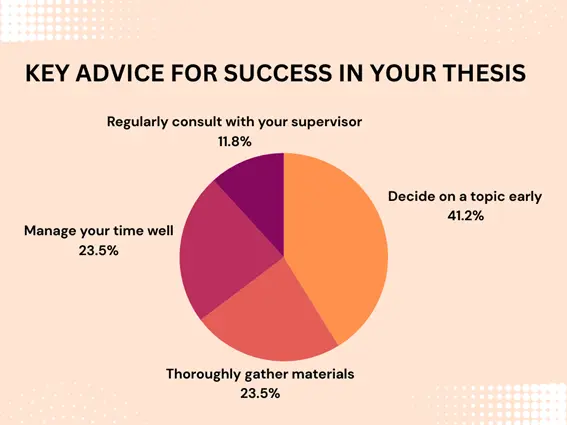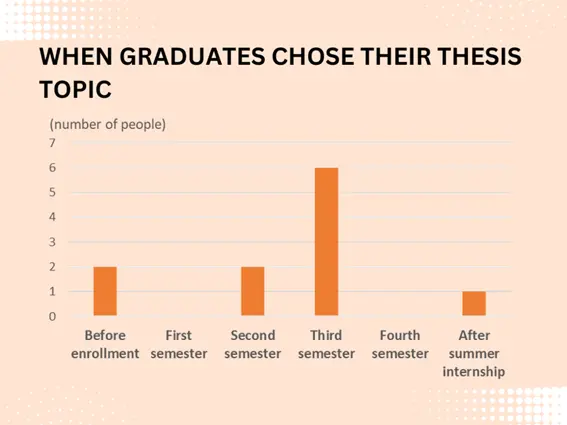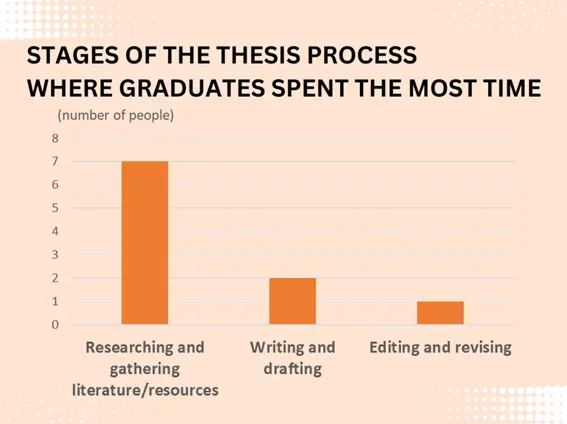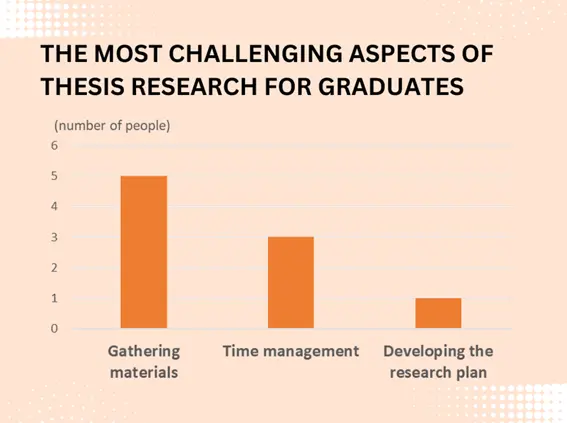What every thesis-writing student should know: lessons from graduates

The thesis-writing process is a long and arduous one. This survey aimed to gather and share the experiences of recent Brandt School graduates regarding the process. The goal is to provide valuable advice and lessons learned from those who have completed their theses, helping future and current senior students navigate their thesis journeys more smoothly. The survey was conducted through an anonymous Google Form and had 10 participants; it was carried out between July and August 2024.
What Graduates Recommend: Tips for Future Thesis Writers
The most common recommendation, given by 41% of respondents, was to decide on a topic early. This allows for more time to focus on research and writing. Meanwhile, about 24% of graduates emphasized the importance of thoroughly gathering materials to build a solid foundation for their work. About the same percentage stressed the need to manage your time well, highlighting the challenges of balancing research, writing, and other commitments. Finally, ~12% of graduates advised regularly consulting with your supervisor, ensuring consistent guidance throughout the thesis process.

Additionally:
• Keep it simple. One respondent advised: "Don't complicate your life unless you want to do a PhD."
• Work on something you enjoy. Another respondent suggested: "Choose a topic that aligns with your future career aspirations, as working on something you enjoy makes the process easier."
Decide on a topic early. The most common advice was to decide on a topic early. About 36% decided before the end of their first year, with the majority (55%) choosing their topic in the third semester. Some also selected their topics during summer internships between their first and second year, showing how internships can provide valuable insights for topic selection.

Start Early and Plan Ahead
Several graduates emphasized the importance of this. One respondent gave advice on how to do so via classes: “I followed a senior's advice to decide the thesis's topic early, at least the areas that you would like to explore. The reason behind this advice is very relevant especially as we only have 5/6 months of thesis writing. If your topic of interest is new to you, it would be so useful that you learn it during your lectures, through in-depth readings or even through writing papers.”
Starting to write early was recommended by a second graduate as well: "Try to find a question, even as an idea, and start working on it. It will evolve with your work, but don’t overread. The key is to start writing as soon as you have a potential path."
Additionally, read broadly and early. Another graduate emphasized the importance of staying updated on the most recent literature: "Read as early and broadly as possible, and it would be even better if you can focus on the most recently published literature."
Give Yourself Plenty of Time for Data Collection
Another key point raised by several respondents was the need to allocate significant time for data collection. Starting data collection as soon as possible gives you more time to analyze and adjust your approach if necessary.
Understand the Importance of a Good Research Question
One respondent mentioned “How to properly formulate a research question and execute the thesis accordingly.” The research question is critical; ensuring yours is well-formulated early on can help guide your entire thesis process in the right direction.
Be Flexible and Adapt as Your Thesis Progresses
Graduates emphasized the importance of staying adaptable, as things are likely to evolve throughout the research and writing process. One respondent noted, “Things would change along the way more than I expected.” Another respondent highlighted the need to start writing early and not worry about perfecting the introduction at the beginning: “Start gathering your data as soon as possible and the introduction is not done until your research and conclusion are finished.” This flexible approach allows you to adjust your research and writing as new insights emerge, helping you avoid getting stuck at the beginning and making for a smoother process.
During the Thesis
Timing and Time Management
As mentioned earlier, many found that gathering literature and resources required the most time and proved to be the most challenging aspect of their research:

Time management also played a major role and was a challenge:

In facing these challenges, graduates mentioned that the following skills and knowledge were particularly helpful during their research:
Essential Skills
These included organizing literature using tools like Zotero, research skills and creativity, logical thinking, and maintaining regular communication with supervisors. A deep understanding of methodology, building networks with relevant organizations, and improving academic writing were also frequently mentioned. Additionally, time management was considered a crucial factor in successfully completing the thesis.
Personal Growth Through the Thesis Experience
Graduates reflected on their personal growth during the thesis process, highlighting several key areas of development. Many noted improvements in logical and academic thinking, as well as time management and the ability to plan a scientifically justified methodology. Some mentioned becoming more realistic about what can be achieved, while others emphasized improved networking and self-criticism. One graduate said, “It was a really nice experience to know how to manage my time, emotions, and energy.”
Applying the Thesis Experience to Future Careers
Graduates also shared how they plan to apply their thesis experience to their future careers. Several mentioned that their thesis topics were closely related to their professional goals, and they intended to further explore these areas in their careers. One graduate plans to use their thesis as a reference for policymaking in their home country, while another is considering pursuing a PhD to deepen their understanding of the field. The networks built during data collection were also noted as potentially valuable for future job applications.
Key Takeaways for Future Thesis Writers
This survey provided valuable insights from graduates on the challenges and strategies involved in the thesis-writing process. Key takeaways include the importance of deciding on a topic early, allocating sufficient time for data collection, and staying flexible throughout the research.
It is worth considering that writing a thesis isn’t just about earning a degree—it can also be an opportunity for personal growth and a chance to develop skills that may be useful in the future. Many graduates found that the experience helped them to grow as individuals and better connect their work to their long-term goals. As you work through your own thesis, taking on challenges with a positive mindset could make the process smoother and leave you better prepared for what is ahead.
We are deeply grateful to the graduates who generously shared their experiences and advice.
About the Author

Nagi Tanimoto is an MPP student at the Willy Brandt School of Public Policy. She has over a decade of experience at the Ministry of Finance in the Japanese government and holds a Bachelor of Laws degree.
~ The views represented in this blog post do not necessarily represent those of the Brandt School. ~